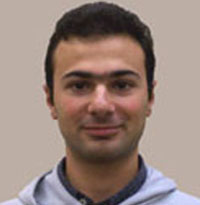Congratulations go to Vittorio Scardaci and Simone Pisana, PhD students in the Electronic Devices and Materials Group (EDM), who have been awarded the European Materials Research Society (EMRS) Graduate Student Award for their work on nanotube photonics and electronics presented at the EMRS 2007 in Strasbourg.


The application for Vittorio's work is in telecommunications. He explains: "Data transmission by optical fibers plays a crucial role in worldwide communications, demanding higher and higher transmission rates. Efficient and low cost components like ultrafast lasers, all-optical switches, noise suppression filters, utilizing materials with strong optical nonlinearities, are thus of great importance. Carbon nanotubes possess strong optical nonlinearities in the telecom wavelength region 1300- 1550 nm and are expected to replace traditional materials, as they are cheaper and easier to fabricate and integrate in optical fiber networks. My work at Cambridge University, Department of Engineering, consists of developing carbon nanotube-polymer composites for application in photonics. The composites can be integrated in prototype optical circuits either as thin film sandwiched in connectors or as waveguides, for ultra-short light pulse generation or noise suppression filters in optical signal regenerators. If nanotube-based composites are employed, it is possible to generate optical pulses shorter than 10-12s from a continuous laser source by the mode-locking technique. Without up-scaling optimization, in a single experiment we are able to potentially produce ~500 composites ready for integration in real optical networks, with costs subsequently dropping by several orders of magnitude, and potential strong impact on current technology."
Simone describes the work he submitted for the EMRS 2007 Graduate Student Award as follows: "Modern microelectronics is one of the main driving forces of today's economy. It is based on technology developed in the 1960s, and since then it has not undergone any major alterations other than drastic miniaturization. As this technology evolves towards its ultimate limitations, a widespread search for novel electronic materials has spurred research in the field of nanomaterials. These materials, with features in the nanometer scale, sometimes just mere atoms thick, enable a range of novel physics that plunge into the quantum world. Materials such as fullerenes, carbon nanotubes, nanowires and graphene have tantalizing potentials for applications in many fields such as electronics, photonics and composites, as well as being outstanding tools for research. Throughout my doctoral studies at the University of Cambridge, Department of Engineering, I have worked on some of the challenges related to carbon nanotube growth, carbon nanotube electronics and new physics of graphene."

